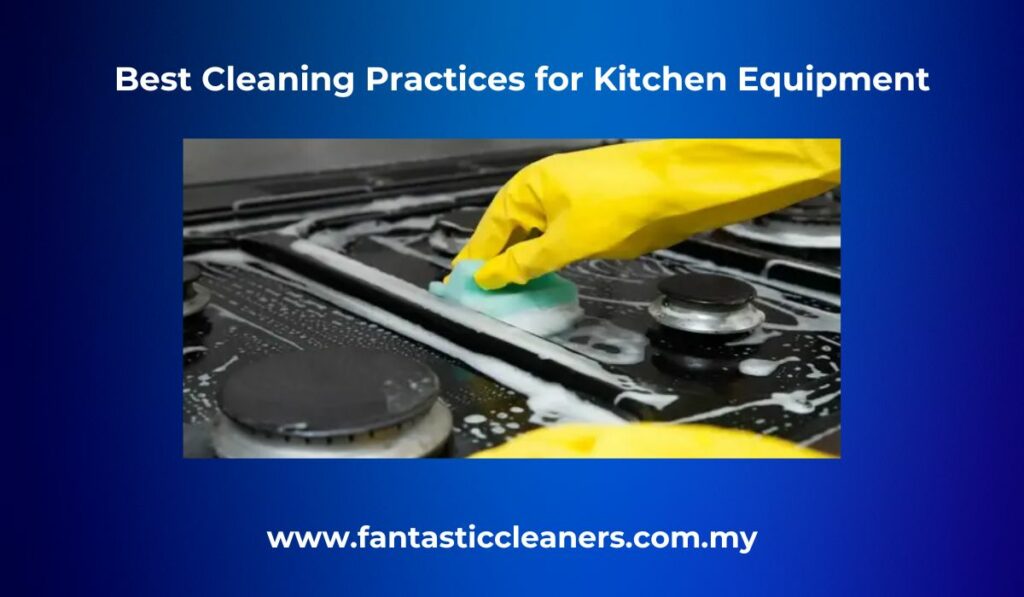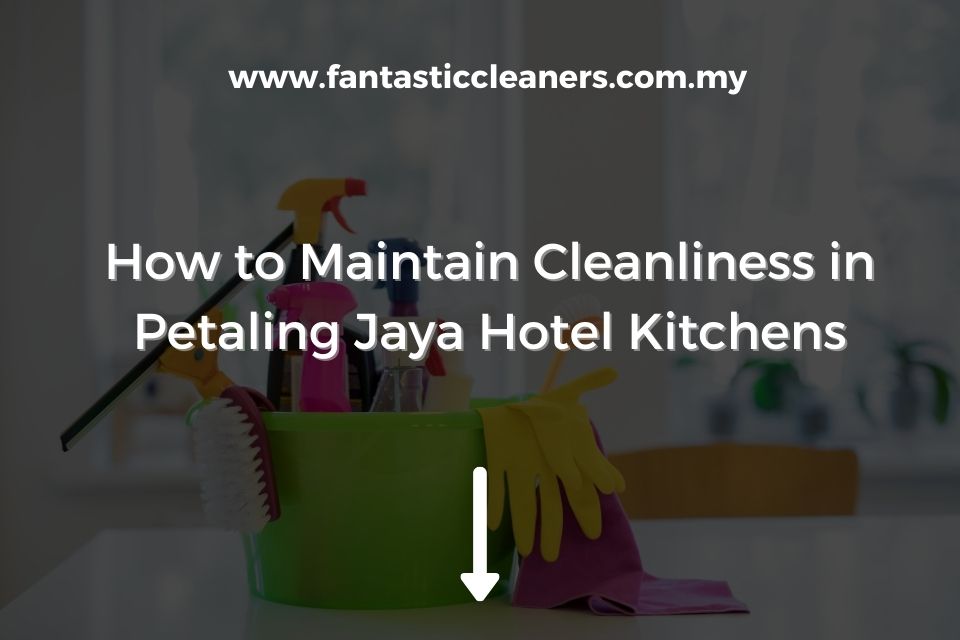Concerned about the cleanliness of hotel kitchens in Petaling Jaya? No need to worry! We have some helpful tips to ensure they’re spotless. Are you prepared? Let’s get started!
Table of Contents
Developing a Cleaning Schedule
In Petaling Jaya hotels, hygiene is key. To guarantee this, work with a professional cleaning service provider in Petaling Jaya and create a cleaning schedule. Here is a guide:
| 1. | Check the kitchen and pinpoint areas that need regular maintenance. |
| 2. | Set frequencies and assign them to staff. |
| 3. | Pick appropriate cleaning products and teach staff how to use them. |
| 4. | Frequently review the schedule to ensure its effectiveness. |
It is vital to uphold cleanliness in hotel kitchens to avoid contamination and keep customers safe. Having a schedule also averts disruptive, unplanned cleanups that can affect food safety.
Handle your food with caution – or it might just handle you back.
Proper Food Handling and Storage Techniques
Keeping a spotless kitchen in a Petaling Jaya hotel requires knowledge about proper food handling and storage. To keep guests safe, cleanliness must be a priority through the use of methods for food storage, prep, and handling. Six essential techniques must be followed:
- Using the ‘First In, First Out’ Inventory System.
- Making sure Cooks and Kitchen Staff wear Gloves and Aprons.
- Storing Food at the Right Temperatures.
- Cleaning and Disinfecting Utensils after each Use.
- Labeling Stored Foods.
- Preventing Cross Contamination by separating Raw and Cooked Food.
Furthermore, floors and surfaces must be kept clean to stop bacteria from spreading. Frequent checks or audits should also be done to make sure safety standards and rules are respected.
By using proper food handling and storage techniques and consistent assessments, hotels can run smoothly while keeping guests and staff safe. Cleaning kitchen tools is like going to the gym – you don’t want to do it, but once it’s done you feel like a champion!
Best Cleaning Practices for Kitchen Equipment

Maintaining the cleanliness of kitchen equipment is key for preparing healthy food for customers. Cleaning correctly can also lengthen the life of kitchen equipment, saving money in the long run.
Here are 6 Best Cleaning Practices for Kitchen Equipment:
- Read the manufacturer’s instructions for cleaning.
- Unplug electrical items first, then wipe with a damp cloth/sponge.
- Use sanitizers or disinfectants to kill bacteria and germs.
- Use specialized tools to clean hard-to-reach places.
- Rinse properly and let dry before using again.
- Keep up a cleaning schedule and record each step.
Remember, different types of kitchen equipment need special cleaning. For instance, fridges need defrosting every couple of months and ovens may need deep-cleaning more often.
By following these Best Cleaning Practices, you can guarantee a safe and hygienic kitchen. Even the shiniest kitchen floors are not safe for snacks!
Cleaning Floors and Surfaces in Hotel Kitchens
Maintaining spotless hygiene in the kitchen is KEY for a hotel’s success. Floors and surfaces need to be clean, since dirt builds up and spills happen. It takes the right protocols to keep floors and surfaces up to sanitary standards.
Here are some tips:
- Clear the floor of anything before mopping.
- Use a cleaner meant for kitchen floors.
- No hot water – it can ruin the finish or make floors slippery.
- Mop from one end to the other, changing mop water often.
- To get hard-to-reach spots, use toothbrushes or tools with cleaner.
- Clean surfaces regularly throughout the day.
Also, keep cautionary signs around the area being cleaned. Plus, strictly enforce waste management protocols to avoid unsanitary buildups. Cleanliness is the #1 ingredient in every dish – unless you want that extra bacteria flavor! In addition to cleanliness, wearing aprons can also prevent food stains and spills from ruining clothing, keeping the kitchen staff looking professional.
Moreover, aprons provide a layer of protection against hot oil splatters and food burns, ensuring the safety of the kitchen staff. By emphasizing the importance of proper hygiene and the benefits of wearing aprons, you can create a safe and sanitary environment for both workers and customers.
Maintaining Cleanliness in Food Preparation Areas
Food preparation areas in Petaling Jaya hotels must be kept clean for the safety of guests. Here are key ways to achieve this:
- Regularly clean and sanitize surfaces, utensils and equipment
- Ensure proper storage of food items
- Implement and stick to hygiene standards and procedures
- Frequently monitor sanitation practices by managers
- Train staff on proper cleaning techniques and hygiene protocols
- Properly dispose of waste materials in designated areas to prevent the spread of pests and bacteria
Inspect and repair any faulty equipment or plumbing systems. Health officials should audit regularly to identify potential sanitation hazards that need to be addressed immediately.
Our kitchen staff are experts in cleanliness and deliciousness, so your guests stay safe and well-fed!
Training and Educating Kitchen Staff on Cleanliness
Ensuring kitchen hygiene is essential for hotels. Training staff on proper sanitation, time management and equipment is key. Floors to utensils, all areas should be covered!
Healthy cooking habits should be stressed, like washing hands and covering hair. Spillages and food particles should be cleaned up correctly.
Storing raw meats and other perishables should be done at appropriate temperatures. Cleaning ovens and fridges should also be part of the training.
By following these techniques, hotels can guarantee high levels of hygiene. It takes patience and dedication, but by keeping everyone informed, managing hotel kitchens can run smoothly with high standards.
Conclusion
Maintaining Cleanliness in Petaling Jaya Hotels’ Kitchens
Hygiene is a must for all hotels. Managers must make sure their kitchens are always clean. Research shows that unhygienic kitchens cause foodborne illnesses. This leads to bad reviews.
Therefore, Petaling Jaya hotels must adopt strict hygiene policies. They should invest in cleaning products, pest control, and professionally trained staff. Plus, they should create daily checklists and inspect the kitchen areas regularly.
Moreover, staff must be trained on food safety protocols. This will ensure proper hygiene throughout the kitchen, including storage rooms and fridges.
Frequently Asked Questions
Why is maintaining cleanliness important in hotel kitchens in Petaling Jaya?
Maintaining cleanliness in hotel kitchens is essential to prevent the spread of diseases and ensure a safe environment for food preparation and consumption.
What are the key areas in a hotel kitchen that require regular cleaning?
Some of the critical areas that need to be cleaned daily include the kitchen floors, walls, counters, sinks, and equipment such as ovens, grills, and refrigerators.
Who is responsible for maintaining cleanliness in the hotel kitchen?
The hotel staff, including the kitchen team and housekeeping staff, share the responsibility of maintaining cleanliness and hygiene in the hotel kitchen.
What are some of the best practices for maintaining cleanliness in the hotel kitchen?
Some of the best practices for maintaining cleanliness in the hotel kitchen include regular cleaning schedules, using the right cleaning products, proper storage of food items, and following food safety guidelines.
How often should the hotel kitchen be deep cleaned?
The kitchen should be deep cleaned at least once a year or whenever there is a change of ownership or management. Additional deep cleaning may be necessary if there is a pest infestation or outbreak of food-borne illnesses.
How can hotel guests ensure that the hotel kitchen is clean and hygienic?
Hotel guests can check for cleanliness and hygiene in the hotel kitchen by observing the food preparation and service areas, checking the hygiene ratings of the hotel, and reporting any concerns to the hotel staff.

